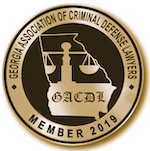Can I Appeal My Case in Order to Keep My Drivers License?
So you have lost your misdemeanor traffic case which is triggering a mandatory report being sent to the Department of Drivers Services (DDS) that will end up with your license being suspended. If you are eligible for conditional driving privileges this might not be such a big deal, but if this is not your first rodeo with DDS you need to act fast. Any challenge to a misdemeanor conviction of any of the traffic laws of the State of Georgia or the traffic laws of any county or municipal government must be filed within 180 days of the date the conviction becomes final. Failure to file the challenge within 180 days shall divest the court of jurisdiction. Simply filing a notice of appeal does not stop DDS from proceeding with an administrative suspension. However, if the appeal is successful and the conviction is overturned, DDS will amend your driving record appropriately upon receipt of the results of the appeal. Dan Palumbo can appeal your conviction in any county in Georgia, including Cobb County, DeKalb County, Fulton County, Gwinnett County, or anywhere in the State of Georgia where you need help.
This is detailed in the Official Code of Georgia Annotated – O.C.G.A. §40-13-33
Are You a First Time Offender?
If you are sentenced under Georgia’s First Time Offenders Act and you successfully complete all terms of your sentence without committing a new crime, you will not have a conviction, and the charge will be sealed from your official criminal history.
If this is the first time that you have been arrested you are most likely scared about how a conviction will impact the rest of your life; and confused as to the process and what will happen going forward. If this sounds like you, you need Dan Palumbo to help you through the process and get the best possible result for you.
If you’ve never been convicted of a crime and you’ve never pled guilty to a crime under a first offender law in any other jurisdiction, you may be eligible for “first offender” consideration under Georgia’s First Offender Law. Call me today (470) 275-1500 for a free consultation. I’m ready to help guide you through the criminal justice process and coach you through this difficult time.
This is detailed in the Official Code of Georgia Annotated – O.C.G.A. §42-8-60
Do you need a Lawyer? You sure do; 470-275-1500.
Entering a Plea of “Guilty” or “Nolo Contendere” To Avoid A Conviction
Georgia’s First Time Offenders Act is a law that allows some first-time offenders charged with certain crimes to enter a plea of “guilty” or “nolo contendere” but avoid a conviction. A person can only use the First Time Offender Act once.
According to the Georgia Bureau of Investigation (GBI), “upon a verdict or plea of guilty or nolo contendere, but before an adjudication of guilt, the court may, in the case of a defendant who has not been previously convicted of a felony, without entering a judgment of guilt and with the consent of the defendant, defer further proceeding and place the defendant on probation as a first offender.”
Being sentenced under Georgia’s First Time Offenders Act may include:
- a period of probation
- community service
- drug and alcohol treatment
- anger management classes
- payment of restitution to victims
- payment of fines and fees
- incarceration
Once the terms of the first offender sentence are successfully completed, and the person is discharged, the charges would be sealed on the GCIC database once the discharge is applied to the GCIC criminal history; however, the information may be available through other sources, including court docket books, criminal justice agency websites, or through “third party” vendors. The record is not automatically sealed based on completion of the sentence requirements.
If a person fails to comply with all of the sentencing requirements in DeKalb County, Fulton County, Gwinnett County, Cobb County, or anywhere in the State of Georgia, or the offender has received prior FOA treatment in another jurisdiction, Georgia Law requires Georgia Crime Information Center (GCIC) to change the first offender sentence to a conviction, the subject is arrested and may be convicted of another offense. Courts may also revoke a first offender sentence, indicate unsatisfactory completion of the first offender sentence or change to an adjudication of guilt.
First Time Offender treatment is not automatic and a Judge must approve of the request. This is where Dan Palumbo can be an advocate for you. Let Dan make compelling arguments how First Time Offender treatment is the right thing for your case. Remember, if the judge denies your request for First Time Offender, you cannot appeal the decision. Don’t go it alone.
You may be eligible for First Time Offender treatment if you: (O.C.G.A. Section 42-8-60(a)
- Have never been convicted of a felony (in any state Have never used first offender before (O.C.G.A. Section 42-8-60(b)
- Your charge is not driving under the influence (DUI)
- Are not charged with obstruction of a law enforcement officer, if such violation results in serious physical harm or injury to such officer, while such officer engaged in his duties, aggravated battery or aggravated assault C.G.A. Sections 16-5-21, 16-5-24, 16-10-24(b)
- Are not charged with a crime related to child pornography
- You are not charged with a serious violent felony as outlined in C.G.A. Section 17-10-6.1
- Are not charged with a serious sexual offense (O.C.G.A. Section 17-10-6.2)
- Are not charged with any crime related to electronic sexual exploitation of a minor, computer pornography (O.C.G.A. Sections 16-12-100, 16-12-100.1, 16-12-100.2)
Remember, a person being granted First Offender Treatment can possibly go to jail, the benefit of First Offender is that it is not a conviction against you. Under the First Time Offenders Act, your sentence may include probation, jail, or a combination of the two. Your First Time Offender will show on your criminal history with the Georgia Crime Information Center (GCIC) criminal history as “First Time Offenders Act” as a result of the case in which you were granted First Offender treatment. And pursuant to the information will be disseminated to prospective employers if they ask.
Once you complete the terms of your sentence, the probation officer should ask the judge to issue an Order of Discharge. The judge will issue the Order, and file it in the Clerk’s office. You should get a Certified Copy from the Clerk and keep it in a safe place. The Clerk will enter the Order of Discharge on your official Georgia criminal history record and the record of the case will be sealed from your GCIC criminal history record for most, but not all, employers.
(O.C.G.A. § 42-8-63.1)
First Offender For Drugs – Conditional Discharge
For drug offenses, Georgia has a separate First Offender law. O.C.G.A 16-13-2 is the “conditional discharge” statute. If you plead guilty under this provision, you do not suffer certain losses of your civil liberties, mainly you do not have your driver’s license suspended. If you successfully complete your sentence under the provisions of 16-13-2, the record of the offense can be cleared from your criminal history.
First Offender For A Criminal Case
Dan Palumbo can show you how First Offender pleas work in the state of Georgia, including reckless driving cases, failure to maintain lane cases, following too closely, theft by taking cases and all other criminal cases.
OCGA 42-8-60 states, in part, that:
(a) If a defendant has not been previously convicted of a felony, the court may, upon a guilty verdict or plea of guilty or nolo contendere and before an adjudication of guilt, without entering a judgment of guilt and with the consent of the defendant, defer further proceedings and:
(1) Place the defendant on probation; or
(2) Sentence the defendant to a term of confinement.
(b) The court shall not sentence a defendant under the provisions of this article unless the court has reviewed the defendant’s criminal record as such is on file with the Georgia Crime Information Center.
(c) When a court imposes a sentence pursuant to this article, it:
(1) Shall state in its sentencing order the prospective effective date of the defendant being exonerated of guilt and discharged as a matter of law, assuming the defendant successfully complies with its sentencing order, provided that such date may not have taken into account the awarding of credit for time served in custody; and
(2) May limit access to certain information as provided in subsection (b) of Code Section 42-8-62.1.
(d) The court may enter an adjudication of guilt and proceed to sentence the defendant as otherwise provided by law when the:
(1) Defendant violates the terms of his or her first offender probation;
(2) Defendant is convicted for another crime during the period of his or her first offender sentence; or
(3) Court determines that the defendant is or was not eligible for first offender sentencing under this article.
(e) A defendant sentenced pursuant to this article shall be exonerated of guilt and shall stand discharged as a matter of law as soon as the defendant:
(1) Completes the terms of his or her probation, which shall include the expiration of the sentence by virtue of the time frame of the sentence passing, provided that such sentence has not otherwise been tolled or suspended;
(2) Is released by the court under Code Section 42-8-37, 42-8-103, or 42-8-103.1 prior to the termination of the period of his or her probation; or
(3) Is released from confinement and parole, provided that the defendant is not serving a split sentence.
No First Offender Treatment For Certain Crimes
A person is not eligible for First Offender Treatment if they have been found guilty or entered a plea of guilty or a plea of nolo contendere for the following offenses:
- Serious violent felony as such term is defined in Code Section 17-10-6.1
- Sexual offense as such term is defined in Code Section 17-10-6.2
- Trafficking of persons for labor or sexual servitude as prohibited by Code Section 16-5-46
- Neglecting disabled adults, elder persons, or residents as prohibited by Code Section 16-5-101
- Exploitation and intimidation of disabled adults, elder persons, and residents as prohibited by Code Section 16-5-102
- Sexual exploitation of a minor as prohibited by Code Section 16-12-100
- Electronically furnishing obscene material to a minor as prohibited by Code Section 16-12-100.1
- Computer pornography and child exploitation as prohibited by Code Section 16-12-100.2
- Any of the following offenses when such offense is committed against a law enforcement officer while such officer is engaged in the performance of his or her official duties: (i) Aggravated assault in violation of Code Section 16-5-21;(ii) Aggravated battery in violation of Code Section 16-5-24 or (iii) Obstruction of a law enforcement officer in violation of subsection (b) of Code Section 16-10-24, if such violation results in serious physical harm or injury to such officer.
- Driving under the influence as prohibited by Code Section 40-6-391.
First Offender For DDS Suspension Of License
Regardless if you receive First Offender treatment for the Treatment (O.C.G.A. §42-8-60) for any crimes in relation to the operation of a motor vehicle this will not prevent the imposition of a driver’s license suspension or revocation. See Salomon v. Earp, 190 Ga. App. 405, 379 S.E.2d 217; 1989 and O.C.G.A. §40-6-391(f).
When a defendant has entered a plea under the First Offender statute for a traffic offense that is reportable to the DDS, the court must report the plea/conviction to DDS. If a conviction for a traffic offense is reported to DDS that mandates suspension of the driver’s license or privilege, and the defendant has been granted “First Offender” status, the driver’s license will still be suspended or revoked as required by law. O.C.G.A. §40-6-391(f) specifically prohibits first offender status for people convicted of, or entering a plea to a DUI.


